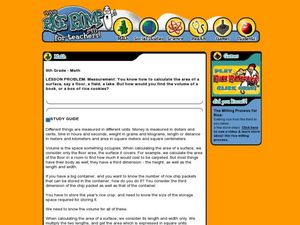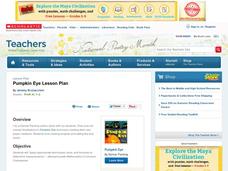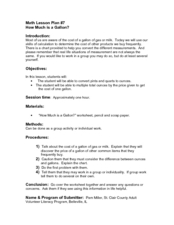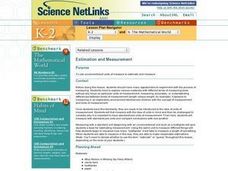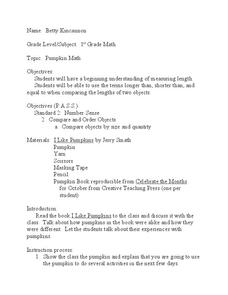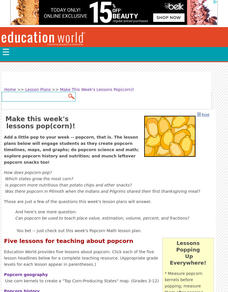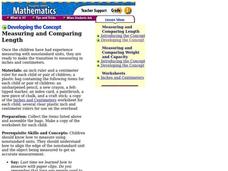Curated OER
The Art of Interpreting Percent
Ddefine the relationships between fractions, decimals, and percentages in a series of lessons. The class practices converting between these three versions of a number. They also find the common factor of a numerator and denominator and...
CK-12 Foundation
Complementary Angles
Here's an interactive that complements your lesson plans. Users of the resource adjust one of the angles in a complementary set to see how it affects the other. A set of challenge questions assesses understanding.
Curated OER
Algebra/Geometry Measurement
Fifth graders investigate units used to measure different geometric situations. In this geometry lesson, 5th graders measure length, mass, volume and temperature using units for measurements. They estimate the measurements before...
Curated OER
Whatcha Gunna Do When the Hulkster's Measuring Too??
Students measure using tools they have made. In this algebra lesson, students measure the height and distance using non-traditional measuring methods. They apply their findings to algebra and trigonometry properties of measurements.
Curated OER
Measuring Marvels
Students investigate measurement. In this library lesson plan, students discuss measurement, read Millions to Measure by David Schwartz, and complete a worksheet. Extra related activities are included in the lesson plan that appeals to...
Curated OER
Investigation-How Far Can You Jump?
Pupils explore measurement. In this math lesson, students measure how far they can jump using blocks. Pupils compare the results when different sized blocks are used. Students estimate the distance jumped.
Curated OER
Measurement: Volume
Sixth graders determine how to find the volume of a box. In this volume lesson, 6th graders participate in a lesson in which the teacher uses the associated study guide to explain how to find the volume of a cubic figure. They use boxes...
Curated OER
Ag In The Outfield
Young scholars explore baseball. This is a cross-curricular plan that includes math, history, and agriculture. Pupils use their five senses to observe the materials a baseball is made from and identify the agricultural products used. In...
Curated OER
Finding Remainders in Pascal's Triangle
Learners use clock arithmetic to find remainders. In this patterns in math lesson, students explore the relationship between clock arithmetic and remainders using a computer applet. Learners also identify patterns in Pascal's triangle...
Curated OER
Pumpkin Eye Lesson Plan
Students listen to the story Pumpkin Eye by Denise Fleming to enjoy the colorful illustrations and to learn about an important ingredient in a pumpkin squares recipe the class will be using. In this cooking lesson, students assist the...
Curated OER
Garden Scavenger Hunt
Second graders examine the metric system. For this metric system lesson, 2nd graders compare measurements of common objects in metric units. Students compete in a garden scavenger hunt.
Curated OER
How Much Is A Gallon?
By engaging in real life examples, learners practice measurement and conversion skills. They review a chart comparing pints, quarts, and gallons. Then, they complete a worksheet involving prices per unit. For example, they calculate how...
Curated OER
Perimeter of Polygons in Word Problems
Peruse these perimeter word problems with beginning geometers, possibly projecting it as an all-class warm up. There are three scenarios here, each with a visual. Scholars determine the perimeter of a swimming pool, find the missing...
Curated OER
Jr. Chef Club
Students examine the food pyramid. In this health/math lesson students make biscuits. Students are assigned a group to measure out ingredients. Students also discuss which part of the food pyramid biscuits fall into and the nutritional...
Curated OER
Measuring Angles
Sixth graders identify and measure right, acute, obtuse, and straight angles. In this geometry lesson, 6th graders review the definition of each angle and are shown examples of each specific angle. Students use toothpicks, gumdrops, and...
Curated OER
Estimation and Measurement
Students explore measurement and estimation with non-standard units. In this measurement lesson, students discuss items that could be used to measure; they use tooth picks to measure specific items around the classroom, both estimating...
Curated OER
How Do Dinosaurs Measure Up?
Students measure and draw to scale, a representation of a dinosaur to practice math skills.
Curated OER
Measuring the Area of Polygons
Fourth graders use pattern blocks to explore areas of polygons. They explain that the answers to the area of the same polygon vary according to the units of measurement used. They visualize how different units of measurement can be used...
Curated OER
Gravity, Angles, and Measurement
Students relate math to real life scenarios. In this geometry lesson, students launch a ball tracking each launch using a graph. They analyze their data for speed, angles and distance, trying to improve on each launch.
Curated OER
Time and Metric Measurements
In this comparing times and measurements worksheet, students read times in seconds, minutes, and hours and metric measurements of mass and length to compare groups of two and write the symbols for less than, equal to, or greater than....
Curated OER
Pumpkin Math
Students discover how to measure the circumference of objects. In this measurement lesson, students use a pumpkin and a tape measure to estimate and find the circumference of the pumpkin.
Curated OER
Make This Week's Lessons Pop(corn)!
Students create popcorn timelines, maps, and graphs; do popcorn science and math; explore popcorn history and nutrition; and munch leftover popcorn snacks too!,
Curated OER
Measuring and Comparing Length
First graders use rulers to measure in both standard notation and centimeters. In this measuring activity, 1st graders discuss the importance of a measuring standard. Students measure in inches and centimeters. Students compare inches to...
Curated OER
Jelly Bean Math
Young scholars estimate, measure, compute, and create patterns using jelly beans. In small groups, they solve various calculations, place jelly beans into groups, invent a new flavor, create a pattern, and complete a worksheet.








